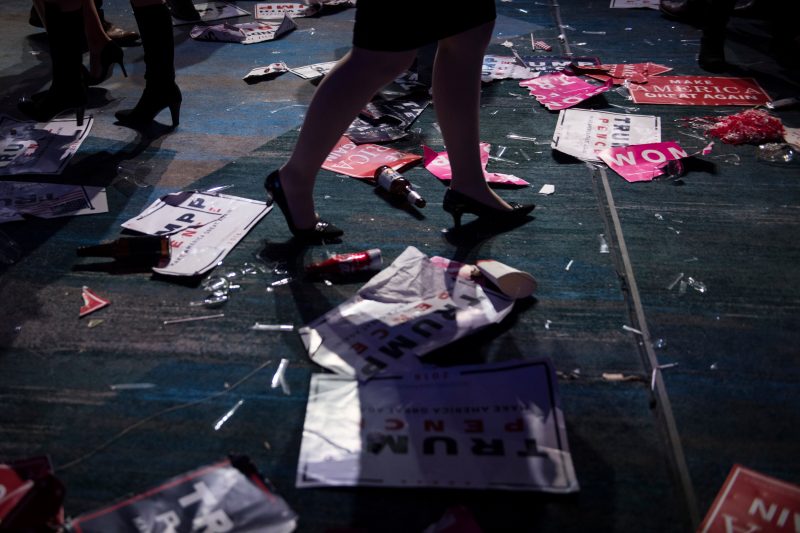
Trump was the beneficiary, not the target, of 2016 and 2020 interference
There’s a line from Fox News host Maria Bartiromo’s show on Sunday that has stuck with me. Referring to an opinion piece in the Wall Street Journal, she asked one of the new co-chairs of the Republican Party whether the media was ready for a seeming eventuality.
“Will the press be ready,” Bartiromo asked, “if, for the third election in a row, our national security state meddles” in the election outcome?
Of all of the people with large platforms in the American media, this framing is probably least surprising coming from Bartiromo, a consumer and producer of fringe-right rhetoric and theorizing. But just because it isn’t surprising, doesn’t mean it isn’t, in the abstract, baffling: How could an ostensible journalist be so completely snookered about the 2016 and 2020 elections? This question, of course, is answered by its preceding sentence.
What occurred in 2016 was that the Russian government and its agents attempted to influence the outcome of the presidential contest. This took two forms. The less impactful one was a long-standing effort to amplify controversy and dissent on social media. The perhaps determinative one was that figures linked to Russia’s intelligence service hacked a Democratic Party network and accessed the email account of a senior Hillary Clinton staffer. They gave the files they acquired to WikiLeaks, which released them before the Democratic convention and, more importantly, in October 2016, during the last weeks before the election.
What allies of Donald Trump (Bartiromo apparently among them) claim happened was, in reality, a response to that Russian effort. Federal officials (the “national security state,” if you prefer) discovered signs that Russia sought to influence the results and began investigating — including various points of contact between Russian actors and Trump’s campaign.
Trump, eager to reinforce that he had won the presidency thanks to his excellence and not foreign help, immediately cast this probe as an effort to subvert him and his administration. He and his allies worked feverishly to offset new developments in the investigation with a narrative about nefarious “deep state” actors desperate to hobble him. This line of argument was investigated by the inspector general for the Justice Department and by a special counsel specifically tasked with proving that Trump was unfairly probed; in neither case was that idea substantiated. No matter. A plurality of Republicans told The Washington Post in a March poll that they don’t think Russia tried to interfere at all.
Of course, Bartiromo’s claim also collapses in the same way that Trump’s often did: If these national security officials were keen on interfering in the election, they didn’t try. A lot of information was available to investigators well before the election ended that never made its way to the public. In fact, soon before Election Day, the New York Times’s sources were telling that paper that there was “no clear link to Russia” within Trump’s campaign — absolving the candidate before the election of the claims that would hang over him for the next two years.
That experience from 2016, though, helped national security officials develop a plan to prevent similar interference efforts in 2020. Social media companies had implemented new processes after the 2016 contest aimed at uprooting misinformation; the government met with representatives of those companies before the 2020 election to alert them to possible influence efforts.
In October 2020, there was suddenly another information dump: The New York Post (after Fox News passed) used information purportedly obtained from a laptop owned by Joe Biden’s son Hunter to obliquely allege wrongdoing by the Democratic candidate. Social media companies briefly limited access to the story out of concern that it was another influence effort, but they soon reversed those limits.
There’s no evidence that the temporary restriction affected the election outcome; if anything, the controversy over the limits might have increased awareness of the story.
For Trump allies and sympathizers, the narrative is generally that the feds tried to silence the laptop story, another example of the “national security state” meddling in an election. But there is no evidence that federal actors tried to muffle the story. Instead, social media executives have testified that their motivation was to “avoid repeating the mistakes of 2016” — giving oxygen to a foreign interference effort.
At the time, whether the laptop was such an effort was very much in question. The information was sourced back to Trump attorney Rudy Giuliani, who had been actively involved in trying to dig up dirt on Joe Biden — including some offered by foreign actors — for more than a year. One of Giuliani’s partners in that effort had been sanctioned as a Russian agent the previous month. A Time article published soon after the laptop story broke reported that information allegedly belonging to Hunter Biden was being offered for sale in Europe in 2019.
Regardless of its backstory, it was the laptop that was the effort to upend the election, not the response. The direct effort to affect the outcome of the race was not a function of what the federal government was doing; it was, instead, a function of what Giuliani was doing on behalf of his boss.
Bartiromo’s framing on Sunday was very much in keeping with Trump’s broader presentation of the state of play: He is an unwitting, hapless target of a powerful system that feels threatened by his return to power. Suggesting that the “deep state” tried to stand in his way in 2016 and 2020 is a reiteration of Trump’s defense against the initial Russia probe and a way of dismissing the indictments that have been handed down against him since he left office. It also inoculates viewers in case something does happen later this year: If so, it’s probably just the feds.
